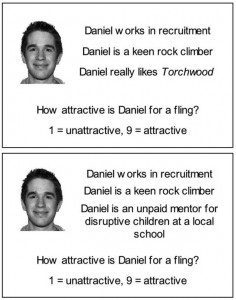 After all the feel-good stories I’ve blogged about so far, I’m thinking I should veer off in a scientific direction here and provide some more objective evidence about the power of kindness.
After all the feel-good stories I’ve blogged about so far, I’m thinking I should veer off in a scientific direction here and provide some more objective evidence about the power of kindness.
We all know that kindness is supposed to make you a happier person, that we inevitably receive something in return for an act of kindness, even if it is simply self-induced joy. But psychological research is even suggesting that kindness essentially boosts your level of attractiveness and chances of finding a mate. A study conducted by the University of Nottingham in England released this past September has contributed to a growing body of research that points toward the adaptive and evolutionary value of altruism.
In the psychological study, the university recruited 32 heterosexual women and 35 heterosexual males to take part in two surveys. In the surveys, each participant rated the attractiveness of opposite-sex hypothetical people for short-term and long-term relationships. The participants were presented cards that included a picture of the target person and a list with three things the person enjoys/does. Ultimately, when the person’s picture was kept constant, those whose descriptions included an altruistic act/helping behavior were rated as more attractive in almost all cases.

Example cards used in study (bottom one includes a helping behavior, the top is considered neutral). From Moore et al. BMC Evolutionary Biology 2013 13:182 doi:10.1186/1471-2148-13-182
Both male and female participants perceived altruistic targets as significantly more attractive for a long term relationship, although the effect was greater in predicting how females rated male targets’ attractiveness than how males rated females. For “short-term flings,” females also rated those with helping behaviors as significantly more attractive than targets with neutral descriptions. The effect was not as strong as with long-term relationships, but it is still an interesting finding. Even when thinking about a short-term fling–and they even specified that no conception would result–the nice guy prevails. On the other hand, there was not a significant finding to indicate that altruistic female targets were more attractive to males for a short-term relationship.
Despite this final finding, kindness appears to have a significant effect on meaningful relationships for both men and women, which suggests greater implications in evolutionary theory and sexual selection. It might seem counter-intuitive that those who are kind are more likely to pass on their genes because they sacrifice themselves to help others. On the contrary, kind individuals appear more likely to be chosen as a mate. According to Moore et al., “Helping behaviours may be attractive because they signal ‘good genes’ and/or because they are perceived as a signal of likely provision of non-genetic benefits (e.g. parental care).”
Now this is not to say that you should be nice to someone in order to get them to hook up with you…but being kind has universal benefits. It seems that there is a reason altruistic behavior should stick around; this study suggests that evolution has made it so. I also do not mean to oversimplify kindness and suggest that there is no such thing as a selfless act, but it is still interesting to see how kindness plays out scientifically and may be worked into our genetic makeup.
Moore et al. Selflessness is sexy: reported helping behavior increases desirability of men and women as long-term sexual partners. BMC Evolutionary Biology 2013 13:182 doi:10.1186/1471-2148-13-182
Leave a Reply